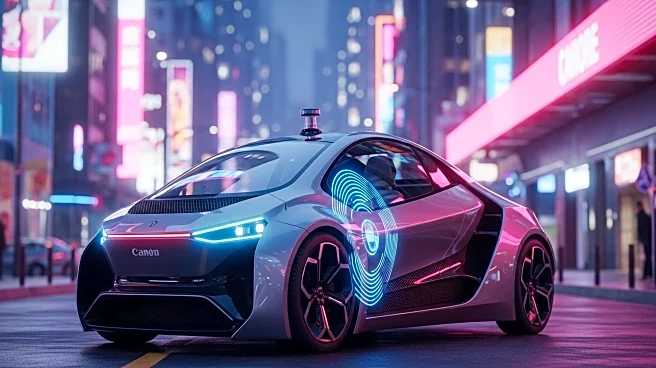What's Happening?
Amazon-owned Zoox has launched its robotaxi service in Las Vegas, offering free rides at popular locations such as Resorts World Las Vegas and AREA15. The service operates through the Zoox app, providing real-time updates and vehicle information. The rides are currently free to help users acclimate to the technology and provide feedback before fares are introduced. Zoox's robotaxi is uniquely designed from scratch, featuring no steering wheel and a face-to-face seating arrangement, allowing movement in both directions without turning. This launch positions Zoox alongside major autonomous vehicle companies like Waymo, Tesla, and Uber, with plans to expand to other U.S. cities including San Francisco, Austin, and Miami.
Why It's Important?
The introduction of Zoox's robotaxi service in Las Vegas marks a significant development in the autonomous vehicle industry, challenging established players like Tesla. By offering free rides, Zoox aims to familiarize the public with its technology and gather valuable user feedback. This approach could accelerate consumer acceptance of autonomous vehicles, potentially influencing market dynamics and regulatory frameworks. The unique design of Zoox's robotaxi differentiates it from competitors, potentially setting new standards for vehicle design and passenger experience in the self-driving sector. As Zoox expands to other cities, it could reshape urban transportation and impact the competitive landscape of autonomous driving technology.
What's Next?
Zoox plans to expand its robotaxi service to other major U.S. cities, including San Francisco, Austin, and Miami. The company will use insights from the Las Vegas launch to refine its service and address any challenges encountered. As Zoox introduces fares, it will likely face increased scrutiny from regulators and competitors, potentially influencing pricing strategies and service offerings. The expansion could prompt responses from other autonomous vehicle companies, leading to innovations and strategic partnerships. Additionally, Zoox's success in Las Vegas may encourage other cities to adopt similar technologies, further advancing the integration of autonomous vehicles into urban transportation systems.
Beyond the Headlines
The launch of Zoox's robotaxi service raises questions about the future of urban mobility and the ethical implications of autonomous driving technology. As self-driving vehicles become more prevalent, issues such as data privacy, cybersecurity, and job displacement in the transportation sector may arise. Zoox's approach to vehicle design and passenger interaction could influence cultural perceptions of car ownership and public transportation. Furthermore, the success of autonomous vehicles could lead to long-term shifts in city planning and infrastructure development, prioritizing technology-driven solutions for traffic management and environmental sustainability.










